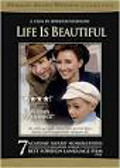
Directed by
Roberto Benigni
116 minutes
Rated M
Reviewed by
Bernard Hemingway


Life Is Beautiful
Italian comedian Roberto Begnini’s enormously successful film carried off the Grand Prix at the 1998 Cannes Film Festival, an Oscar for Best Foreign Film, and, quite incredibly, the Best Actor Oscar for the director (either this was simply a vote of sympathy or the Academy was not familiar with Begnini's trade-mark manic comedic schtick) an outcome which made some people angry for its apparent trivializing of the Holocaust but its box office success indicates that it spoke to a lot of people (a sense of humour is, after all, well-recognized as a critical factor in survival).
Telling the story of a happy-go-lucky Italian Jew, Guido (Begnini), who falls in love with a school-teacher (Nicoletta Braschi, Benigni's real-life wife), wins her with his comical ways, has a child with her and then gets shipped off with his young son to a concentration camp, Life Is Beautiful rests on the principle of laugh-and-the-world-laughs-with-you, a sentiment that works in the context of a three minute pop song and that certainly is worth recommending as a working nostrum for the everyday but which might well seem hardly adequate to deal with the wilful extermination of four million Jews.
Films such as Chaplin’s The Great Dictator, Ernst Lubisch’s To Be Or Not To Be or Mel Brook’s The Producers have used humour to satirize the Nazis but Begnini’s film for hte most part is not a satire, indeed the Nazis are quite marginal figures, but is rather, as the opening voice-over tells us, a fable about a father's sacrifice, the power of love and the ultimate triumph of the human spirit. The problem is however in making Guido such an indefatigably optimistic soul and weaving around him a set of impossibly convenient circumstances to vindicate his positivity (such as commandeering the camp’s PA system and the Nazi’s gramophone to cheer up his wife), Begnini jeopardizes the laudable premise of a lot of its purchase. It is in other words it can seem too comedic for its own good.
Nevertheless, Begnini does achieve a certain poignancy as he charts his hero’s journey from the love-struck suitor to the defiant father being led away to his execution. One of the most touching moments comes late in the film after Guido has re-connected with Dr. Lessing (Horst Buchholz), a German physician with whom he traded riddles in happier days. Guido thinks that the doctor is going to help him but then realizes that the doctor is only interested in continuing their riddling, Begnini thus succinctly capturing the terrible banality of evil.
In the final analysis however we know enough of the Holocaust and we also know that life goes on. In this respect Life Is Beautiful is about the persistence of love and humanity - a message which hardly deserves to be argued with.
Want something different?





